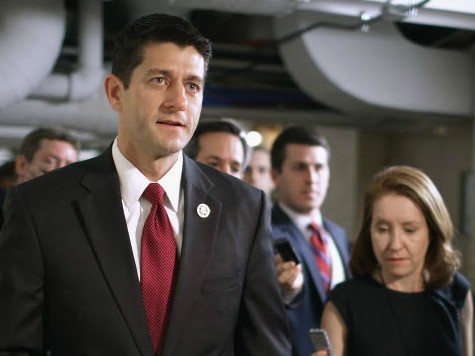
On Thursday, Rep. Paul Ryan (R-WI) pushed for “Opportunity Grants” to streamline funding for welfare and social services to give states more flexibility to combat poverty.
Speaking at the American Enterprise Institute (AEI) in Washington, D.C., Ryan said the federal government often goes into communities with too many “strings and rules” and crowds out services that work. He said “social antibodies” that can combat poverty are displaced and pushed to the side.
He called for Opportunity Grants and an expansion of the Earned Income Tax Credit (EITC) to more people without children by lowering the minimum age to 21 and doubling the maximum credit to $1,005. He said the federal government spends “almost $800 billion on 92 federal programs each year to fight poverty,” but “the poverty rate is the highest in a generation.” He said the “budget neutral” programs would be funded by eliminating ineffective programs and corporate welfare instead of raising taxes.
The Opportunity Grants, Ryan said, would “consolidate up to eleven federal programs into one stream of funding to participating states” to “let states try different ways of providing aid and then to test the results.” He said “participation would be voluntary, no state would have to join,” and programs would not be expanded “until all the evidence was in.”
“The point is, don’t just pass a law and hope for the best,” he said. “If you’ve got an idea, let’s try it. Test it. See what works. Don’t make promise after promise. Let success build on success.”
Ryan said there would be four conditions for the Opportunity Grants. First, money would have be spent on “people in need–not roads, not bridges, no funny business.” Second, “every person who can work should work.” Third, the “state welfare agency can’t be the only game in town” and people must be given at least one other option like a non-profit, for-profit, or even an community organization that competes with the state agency. Fourth, Ryan said “the federal government and the state must agree on a neutral third party to keep track of progress” and test the results.
“In short, we’re re-conceiving the federal government’s role,” he said. “No longer will it try to supplant our communities but to support them. In my view, the federal government is the rearguard–it protects the supply lines. But the people on the ground–they’re the vanguard. They fight poverty on the front lines.”
He said “if the public and private sector work together, we can offer a more personalized, customized form of aid–one that recognizes both a person’s needs and their strengths–both the problem and the potential.”
In addition to expanding of the Earned Income Tax Credit (EITC), Ryan said the country needed to “expand access to education with accreditation reforms” and “bring competition to the college cartels” and reform job-training programs. He also called for commonsense criminal justice reforms that gives judges more discretion on sentencing for non-violent, low-risk offenders and combat recidivism. Ryan also said federal agencies that want programs that would burden low-income families should go to Congress and fight for those programs in public on the record.
On a panel discussion after the speech, Ryan said that instead of treating symptoms of poverty and “propping up a poverty management system,” the federal government should focus more on getting out of the way and letting states and local communities implement more results-oriented programs that integrate public and private resources. He also called for “licensing reforms at the local levels” for occupations like barbers and beauticians to allow more Americans in poverty or trying to avoid recidivism to get and maintain jobs with the skills that they have.
Calling on Americans to listen to the “smartest voices in the room,” Ryan said he has spent the year traveling to struggling neighborhoods across the country with Bob Woodson, the community organizer who runs the Center for Neighborhood Enterprise. After discovering that “federal aid is fragmented and formulaic and Washington looks at each person’s needs in isolation,” Ryan said he now wants to start a conversation about giving state and local governments “more flexibility in exchange for more accountability.”
Woodson, who was also on the panel with Ryan, said that there are plenty of Americans who, because of illness or bad luck, use and need “welfare programs as an ambulance.” But he also noted that there are many others who use welfare programs for “transportation.” Woodson said because the left and the right tend to stereotype welfare recipients as the former and the latter, respectively, effective solutions are often not implemented. Ryan said the federal government can “command the supply lines” but the “people on the front lines” who confront poverty “eye to eye” and “soul to soul” ultimately make the difference.

COMMENTS
Please let us know if you're having issues with commenting.